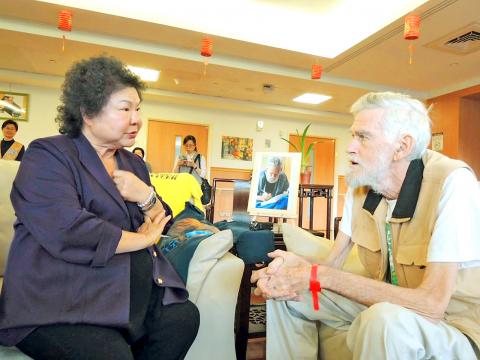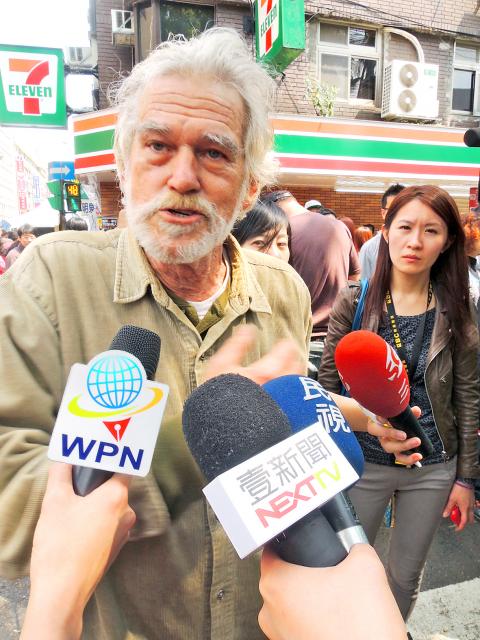Human rights and social activist Lynn Miles, a well-known fighter for Taiwanese democracy, died early yesterday morning at a hospice in New Taipei City.
The 72-year-old American, also known by his Chinese name Mei Hsin-yi (梅心怡), had been suffering from mesothelioma, a cancer linked to asbestos that attacks the membrane lining of the lungs and abdomen, for several months, and spent the past few weeks at the Tzu Chi General Hospital in Xindian District (新店). He died at 1:30am.
Miles first came to Taiwan in 1962 to study Chinese. He became friends with people such as National Taiwan University professor Peng Ming-min (彭明敏) and writer Li Ao (李敖), and in 1967, he and a German friend, Klaus-Peter Metzke, opened The Barbarian (野人咖啡室) cafe in Ximending, where people could meet and exchange ideas.

Photo: Liu Li-jen, Taipei Times
He helped Peng, who, along with two of his students, had been convicted for publishing a manifesto calling for the overthrow of the Chiang Kai-shek (蔣介石) regime, escape house arrest and flee the nation for exile in Sweden in 1970.
The Chiang government deported Miles the following year, after he tried to help Li and Peng’s two students after they were arrested. The government blacklisted him from returning to Taiwan until 1996.
Miles moved to Osaka, Japan, where he continued his pro-democracy efforts for Taiwan, establishing the International Committee for the Defense of Human Rights in Taiwan. The committee helped smuggle information about political prisoners out of Taiwan and Miles wrote reports on the political situation and the prisoners, and provided them to Amnesty International and other rights groups, reporters and churches.

Photo: Hsieh Wen-hua, Taipei Times
He spent several years in the US before returning to Taiwan once the blacklist was lifted.
He received permanent residency in Taiwan in 2006 for his “special contributions to the nation” and in recent years taught at Fu Jen Catholic University.
The New Jersey native continued to be a familiar face at protests over rights issues and spoke out on a variety of issues, including efforts to end the death penalty in Taiwan, and organizing several Peacefests. He burned his US passport in front of the American Institute in Taiwan in Taipei on March 23, 2003, to protest the US-led war in Iraq.
He coauthored with Linda Gail Arrigo a book about the human rights movement in Taiwan, A Borrowed Voice: Taiwan Human Rights through International Networks, 1960-1980, which was published in 2008.
In February, Miles was among 119 people indicted by Taipei prosecutors for taking part in Sunflower movement-linked rallies in Taipei in the spring of last year against the government’s handling of a cross-strait service trade agreement.
As Miles’ health worsened in recent weeks, several prominent Democratic Progressive Party (DPP) members visited him at the hospital, including DPP Chairperson Tsai Ing-wen (蔡英文) and Kaohsiung Mayor Chen Chu (陳菊), while a Peacefest to celebrate his life was held on May 30.
Tsai, who is currently on a trip to the US, mourned Miles’ death.
“Leaning about his passing away is a very saddening thing,” Tsai said in a statement on her official Facebook page. “As an American, he has always been a good friend of Taiwan, who long assisted Taiwan in democratization, and sincerely hopes that the Taiwanese people could live in freedom and democracy.”
She called Miles a witness of a time.
“From undemocratic to democratic, it is because of many friends like him who took actions to support us that Taiwan is able to become democratized in the end,” Tsai said. “May he rest in peace, and may he be free of all pains.”
Additional reporting by Loa Iok-sin

SECURITY: As China is ‘reshaping’ Hong Kong’s population, Taiwan must raise the eligibility threshold for applications from Hong Kongers, Chiu Chui-cheng said When Hong Kong and Macau citizens apply for residency in Taiwan, it would be under a new category that includes a “national security observation period,” Mainland Affairs Council (MAC) Minister Chiu Chui-cheng (邱垂正) said yesterday. President William Lai (賴清德) on March 13 announced 17 strategies to counter China’s aggression toward Taiwan, including incorporating national security considerations into the review process for residency applications from Hong Kong and Macau citizens. The situation in Hong Kong is constantly changing, Chiu said to media yesterday on the sidelines of the Taipei Technology Run hosted by the Taipei Neihu Technology Park Development Association. With

CARROT AND STICK: While unrelenting in its military threats, China attracted nearly 40,000 Taiwanese to over 400 business events last year Nearly 40,000 Taiwanese last year joined industry events in China, such as conferences and trade fairs, supported by the Chinese government, a study showed yesterday, as Beijing ramps up a charm offensive toward Taipei alongside military pressure. China has long taken a carrot-and-stick approach to Taiwan, threatening it with the prospect of military action while reaching out to those it believes are amenable to Beijing’s point of view. Taiwanese security officials are wary of what they see as Beijing’s influence campaigns to sway public opinion after Taipei and Beijing gradually resumed travel links halted by the COVID-19 pandemic, but the scale of

A US Marine Corps regiment equipped with Naval Strike Missiles (NSM) is set to participate in the upcoming Balikatan 25 exercise in the Luzon Strait, marking the system’s first-ever deployment in the Philippines. US and Philippine officials have separately confirmed that the Navy Marine Expeditionary Ship Interdiction System (NMESIS) — the mobile launch platform for the Naval Strike Missile — would take part in the joint exercise. The missiles are being deployed to “a strategic first island chain chokepoint” in the waters between Taiwan proper and the Philippines, US-based Naval News reported. “The Luzon Strait and Bashi Channel represent a critical access

Pope Francis is be laid to rest on Saturday after lying in state for three days in St Peter’s Basilica, where the faithful are expected to flock to pay their respects to history’s first Latin American pontiff. The cardinals met yesterday in the Vatican’s synod hall to chart the next steps before a conclave begins to choose Francis’ successor, as condolences poured in from around the world. According to current norms, the conclave must begin between May 5 and 10. The cardinals set the funeral for Saturday at 10am in St Peter’s Square, to be celebrated by the dean of the College